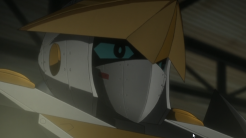





After the complete disaster that was Guilty Crown last year, Production IG had to make up for something. They did so with Psycho Pass, that really was one hell of a ride. As for their other 2-cour Noitamina-series this half year, Robotics;Notes… it’s a bit more difficult. And don’t get me wrong: this is in no way as bad as Guilty Crown. It’s much better, but also very difficult to judge. This series is really ambitious… it just doesn’t work.
I actually liked Robotics;Notes in its first half. It had this ambition, yet at the same time it spent a lot of time fleshing out its characters and focusing on believability. It might sound weird to see this from a series that has a large robot on its promotional material, but that’s the point: one of the subplots in this series offers a bit of a deconstruction of Giant Robot building as it takes a look some of the issues of teenagers piloting these things that most other series tend to ignore.
Then there is a subplot about solar storms, a subplot about miniature robot fighting, a subplot about an evil conspiracy, and that list goes on and on. This is what I mean by the ambition: in the first half this show balances all of these subplots together that at first sight don’t seem to have anything to do with each other. This build-up for me was the best part of this series, and it’s always a question of what this show will focus on next… in its first half.
And then its second half comes, and it’s supposed to weave all of these subplots together… and it kinda fails. A lot. In many ways. There are some things that you’d think are related to each other, which actually totally aren’t, and the ones that are related to each other are brought together in such a shoehorned way that it breaks all suspense of disbelief that it has previously built up.
The show basically tries to run through a checklist of all stories that it needs to wrap up, without any care of making them flow into each other. Because of this entire subplots are conveniently forgotten until they are relevant again without much reason. But granted, the stories that it try to tell have some good concepts and ideas behind them. the character-development also works well enough and it has still enough to make it worth watching. And then the finale comes. I have no idea what happened, but things totally go wrong. All of the build-up just gets thrown out of the window and the show turns into a cheesy mess of plot devices. Talk about a let-down.
So yeah, solid show. Bad ending. That makes it really hard for me to recommend this series, because this series doesn’t just have a bad ending, it’s got a bad ending that invalidates much of the earlier build-up. Watch this if you want a different take on Super Robots. But then again, there are enough shows that also do that.
One-Sentence Review: Robotics;Notes is a very ambitious series that juggles around all sorts of stuff, which works well in terms of build-up, but not in terms of pay-off.
Suggestions:
– Bokura no
– Birdy the Mighty Decode
– Dennou Coil




